Southbound Train
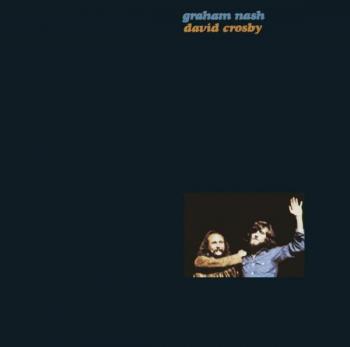
[1972]
Scritta da Graham Nash
Nell'album "Graham Nash / David Crosby"
(Alla steel guitar, Jerry Garcia dei Grateful Dead)
Testo da Genius
Questo treno che scivola verso il sud ha un carico speciale: soldati morti in una qualsiasi guerra (ma era il 1972, quella in Vietnam volgeva alla fine ma infuriava ancora) che tornano a riposare per sempre nella terra dei padri... Con loro sono state sepolte anche la Libertà, l'Eguaglianza e la Fraternità con cui tutti i leader sono soliti sciacquarsi la bocca...
Scritta da Graham Nash
Nell'album "Graham Nash / David Crosby"
(Alla steel guitar, Jerry Garcia dei Grateful Dead)
Testo da Genius
Questo treno che scivola verso il sud ha un carico speciale: soldati morti in una qualsiasi guerra (ma era il 1972, quella in Vietnam volgeva alla fine ma infuriava ancora) che tornano a riposare per sempre nella terra dei padri... Con loro sono state sepolte anche la Libertà, l'Eguaglianza e la Fraternità con cui tutti i leader sono soliti sciacquarsi la bocca...
Liberty, laughing and shaking your head
(continua)
(continua)
inviata da Bernart Bartleby 19/10/2020 - 21:06
Percorsi:
Guerra in Vietnam: vista dagli USA, Treni
I Fought the Law (and I Won)

La canzone originale di Sonny Curtis. incisa nel 1959 dai Crickets
E' stata interpretata da numerosissimi gruppi (ma la versione passata alla storia è quella dei Clash) : Widespread Panic, Richard Clapton, Ducks Deluxe, She Trinity, Beatsteaks, Viper, Bryan Adams, John Cougar Mellencamp, Johnny Cash, Bruce Springsteen, Roy Orbison, Tom Petty, Social Distortion, Stiff Little Fingers, Waylon Jennings, Gary Allan, Green Day, Alvin and the Chipmunks, Ska-P, the Jolly Boys, Grateful Dead, Stray Cats, Mary's Danish, Claude François, Mano Negra, the Big Dirty Band, Lolita No. 18, the Brian Jonestown Massacre, Attaque 77, El Noi del Sucre, Die Toten Hosen, Status Quo, Nanci Griffith, La Vida Bohème, Anti-Flag, Chumbawamba, Tsuyoshi Kawakami and His Moodmakers, the Airborne Toxic Event, The Bad Shepherds, Johnny Marr, Colin Farrell, Kris Kristofferson, The Bangles.
Per quanto riguarda le band italiane i Gang la eseguono in tutti i concerti, anche con la Banda Bassotti, Niutàun, Guacamaya, Malavida, Hombre all'ombra, l'hanno rifatta anche i Finley.
E' stata interpretata da numerosissimi gruppi (ma la versione passata alla storia è quella dei Clash) : Widespread Panic, Richard Clapton, Ducks Deluxe, She Trinity, Beatsteaks, Viper, Bryan Adams, John Cougar Mellencamp, Johnny Cash, Bruce Springsteen, Roy Orbison, Tom Petty, Social Distortion, Stiff Little Fingers, Waylon Jennings, Gary Allan, Green Day, Alvin and the Chipmunks, Ska-P, the Jolly Boys, Grateful Dead, Stray Cats, Mary's Danish, Claude François, Mano Negra, the Big Dirty Band, Lolita No. 18, the Brian Jonestown Massacre, Attaque 77, El Noi del Sucre, Die Toten Hosen, Status Quo, Nanci Griffith, La Vida Bohème, Anti-Flag, Chumbawamba, Tsuyoshi Kawakami and His Moodmakers, the Airborne Toxic Event, The Bad Shepherds, Johnny Marr, Colin Farrell, Kris Kristofferson, The Bangles.
Per quanto riguarda le band italiane i Gang la eseguono in tutti i concerti, anche con la Banda Bassotti, Niutàun, Guacamaya, Malavida, Hombre all'ombra, l'hanno rifatta anche i Finley.
I FOUGHT THE LAW
(continua)
(continua)
inviata da dq82 6/1/2016 - 18:52
We Can Run
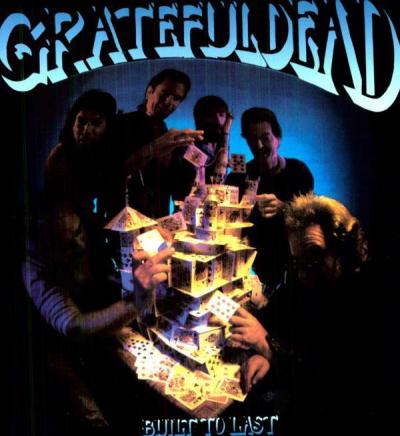
[1989]
Scritta da Brent Mydland (1952-1990) tastierista del gruppo, in collaborazione con il solito John Perry Barlow, autore di gran parte dei testi dei Dead.
Nell’album intitolato “Built to Last”, il tredicesimo per la band e anche l’ultimo, proprio a causa dell’improvvisa morte di Mydland poco tempo dopo.
Scritta da Brent Mydland (1952-1990) tastierista del gruppo, in collaborazione con il solito John Perry Barlow, autore di gran parte dei testi dei Dead.
Nell’album intitolato “Built to Last”, il tredicesimo per la band e anche l’ultimo, proprio a causa dell’improvvisa morte di Mydland poco tempo dopo.
We don't own this place, though we act as if we did,
(continua)
(continua)
inviata da Bernart Bartleby 5/8/2014 - 16:03
Percorsi:
Guerra alla Terra
Supper's Ready

C'è solo un altro gruppo di cui sopporterei un pezzo di 30 minuti, si chiamano Grateful Dead. Lì però le traduzioni risulterebbero ancora più difficili...
Pierluigi 1/12/2013 - 00:06
Whiskey In The Jar
anonimo
Questo tradizionale irlandese viene inserito per l'ultima strofa della versione dei Thin Lizzy, poi ripresa anche dai Metallica:
Ora ad alcuni uomini piace pescare ed ad altri andare a caccia di uccelli
Ed ad alcuni uomini piace sentire, sentire il cannone sparare con fragore
Io amo dormire, specialmente nella camera della Mia Molly
Ma qui sono in prigione, sono qui son con una palla (al piede) e una catena che mi lega sì
Whiskey in the Jar è una canzone tradizionale irlandese che parla di un bandito (solitamente dei monti di Cork e Kerry) tradito dalla propria moglie o dalla propria amante. È una delle canzoni tradizionali irlandesi più eseguite ed è stata incisa da artisti come i The Dubliners, The Pogues, Peter, Paul and Mary, The Highwaymen, Roger Whittaker, the Clancy Brothers e Tommy Makem, The Irish Rovers, Poxy Boggards, The Limeliters, King Creosote, The Shatilla Shakers e... (continua)
Ora ad alcuni uomini piace pescare ed ad altri andare a caccia di uccelli
Ed ad alcuni uomini piace sentire, sentire il cannone sparare con fragore
Io amo dormire, specialmente nella camera della Mia Molly
Ma qui sono in prigione, sono qui son con una palla (al piede) e una catena che mi lega sì
Whiskey in the Jar è una canzone tradizionale irlandese che parla di un bandito (solitamente dei monti di Cork e Kerry) tradito dalla propria moglie o dalla propria amante. È una delle canzoni tradizionali irlandesi più eseguite ed è stata incisa da artisti come i The Dubliners, The Pogues, Peter, Paul and Mary, The Highwaymen, Roger Whittaker, the Clancy Brothers e Tommy Makem, The Irish Rovers, Poxy Boggards, The Limeliters, King Creosote, The Shatilla Shakers e... (continua)
As I was going over the far famed Kerry mountains
(continua)
(continua)
inviata da DonQuijote82 22/10/2010 - 19:40
Two Soldiers
“Two Soldiers” è un arrangiamento che Dylan fece di “The Last Fierce Charge”, una canzone tradizionale risalente alla guerra civile americana. Fu Jerry Garcia dei Grateful Dead a farla conoscere a Dylan nella versione – già intitolata “Two Soldiers” - incisa nel 1973 da Hazel & Alice, ossia il duo composto dalle musiciste Hazel Dickens e Alice Gerrard, moglie di Mike Seeger, fratello di Pete Seeger.

inviata da Bartleby 19/10/2010 - 11:55
Standing On the Moon
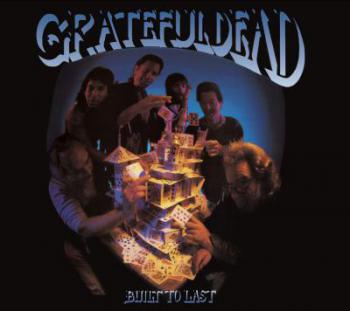
[1989]
Album "Built to Last"
Words by Robert Hunter
Music by Jerry Garcia
Album "Built to Last"
Words by Robert Hunter
Music by Jerry Garcia
Standing on the moon
(continua)
(continua)
inviata da Alessandro 18/2/2010 - 12:37
U.S. Blues

[1974]
Album "Grateful Dead from the Mars Hotel"
Words by Robert Hunter
Music by Jerry Garcia
Album "Grateful Dead from the Mars Hotel"
Words by Robert Hunter
Music by Jerry Garcia
Red and white
(continua)
(continua)
inviata da Alessandro 18/2/2010 - 11:20
Throwing Stones
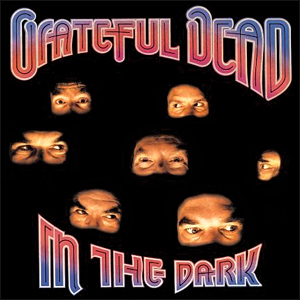
[1982]
Album "In the Dark" (1987)
Words by John Perry Barlow
Music by Bob Weir
Il brano è incluso pure nella compilation "Greenpeace: Rainbow Warriors" uscita nel 1989 per commemorare l'attentato subito da Greenpeace nel 1985, quando i servizi segreti francesi affondarono la nave ammiraglia del movimento, la "Rainbow Warrior", mentre si trovava alla fonda nel porto neozelandese di Auckland. Nell'attentato morì il fotografo Fernando Pereira, attivista di Greenpeace.
Album "In the Dark" (1987)
Words by John Perry Barlow
Music by Bob Weir
Il brano è incluso pure nella compilation "Greenpeace: Rainbow Warriors" uscita nel 1989 per commemorare l'attentato subito da Greenpeace nel 1985, quando i servizi segreti francesi affondarono la nave ammiraglia del movimento, la "Rainbow Warrior", mentre si trovava alla fonda nel porto neozelandese di Auckland. Nell'attentato morì il fotografo Fernando Pereira, attivista di Greenpeace.
Picture a bright blue ball, just spinning, spinnin free,
(continua)
(continua)
inviata da Alessandro 18/2/2010 - 11:02
(Walk Me Out In The) Morning Dew
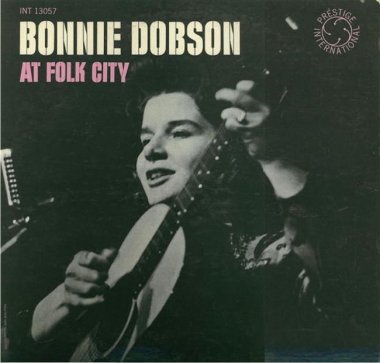
(1962)
Portata poi al successo dai Grateful Dead, questa canzone che si svolge all'indomani di una catastrofe nucleare è stata scritta dalla cantautrice canadese Bonnie Dobson.
[RJ] Why don't we go back a little and talk about the inspiration for that song, set the context. I think there were a lot of social and political things going on at that time.
[BD] Yea, well actually what happened with that song is that, I think it must have been maybe 1960 or 1959, I can't remember, when I saw a film called "On The Beach" and it made a tremendous impression on me, that film. Particularly at that time because everybody was very worried about the bomb and whether we were going to get through the next 10 years. It was a very immediate problem and I remember I was singing in Los Angeles at the Ashe Grove and I sat up all night talking with some friends. I was staying with a girl named Joyce Nastelin(sp)... (continua)
Portata poi al successo dai Grateful Dead, questa canzone che si svolge all'indomani di una catastrofe nucleare è stata scritta dalla cantautrice canadese Bonnie Dobson.
[RJ] Why don't we go back a little and talk about the inspiration for that song, set the context. I think there were a lot of social and political things going on at that time.
[BD] Yea, well actually what happened with that song is that, I think it must have been maybe 1960 or 1959, I can't remember, when I saw a film called "On The Beach" and it made a tremendous impression on me, that film. Particularly at that time because everybody was very worried about the bomb and whether we were going to get through the next 10 years. It was a very immediate problem and I remember I was singing in Los Angeles at the Ashe Grove and I sat up all night talking with some friends. I was staying with a girl named Joyce Nastelin(sp)... (continua)
Walk me out in the morning dew my honey,
(continua)
(continua)
inviata da Lorenzo Masetti 10/5/2009 - 12:29
Can We Go Higher ?
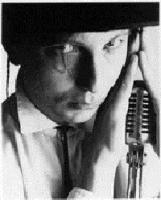
Nenad Bach wrote this song when war in Croatia broke out.
Its meaning is to get above the eavil and hatred in the world. In addition, he has performed all over the world with a wide range of artists, including Luciano Pavarotti, Bono & The Edge (U2), Brian Eno, Indigo Girls, Richie Havens, Garth Hudson & Grateful Dead, Martin Sheen, Michael York, John Malkovich, Ellen Burstyn, and many more. He performed at Woodstock '94, and in 1998 he made a compilation album with Bruce Springsteen, Leonard Cohen and Allen Ginsberg.
Its meaning is to get above the eavil and hatred in the world. In addition, he has performed all over the world with a wide range of artists, including Luciano Pavarotti, Bono & The Edge (U2), Brian Eno, Indigo Girls, Richie Havens, Garth Hudson & Grateful Dead, Martin Sheen, Michael York, John Malkovich, Ellen Burstyn, and many more. He performed at Woodstock '94, and in 1998 he made a compilation album with Bruce Springsteen, Leonard Cohen and Allen Ginsberg.
A thousand candles in the air
(continua)
(continua)
inviata da Teo Zokvich 22/1/2008 - 23:24
Percorsi:
Guerre nei Balcani negli anni '90
Marriott, U.S.A.

Una canzone scritta dalla Baez nel 1982 ed inclusa nel triplo "Rare, Live & Classic" del 1993 (Baez la canta accompagnata dai Grateful Dead)
Nella canzone c'è un riferimento alla celebre "crisi degli ostaggi": alla fine del 1979, in risposta all'ospitalità offerta dagli USA allo Scià deposto, gli iraniani sequestrarono il personale dell'ambasciata USA a Tehran. Il sequestro durò fino all'inizio del 1981 e fu risolto in via diplomatica, nonostante che gli USA di Carter avessero anche tentato un blitz armato (Operation Eagle Claw) per liberare gli ostaggi, operazione il cui fallimento compromise la rielezione di Jimmy Carter alla Casa Bianca...
Il protagonista della canzone della Baez, un obiettore di coscienza che ha perso il fratello in guerra, festeggia come tutti il ritorno dei compatrioti liberati ma nel profondo si chiede "if this is how heroes are made"...
Nella canzone c'è un riferimento alla celebre "crisi degli ostaggi": alla fine del 1979, in risposta all'ospitalità offerta dagli USA allo Scià deposto, gli iraniani sequestrarono il personale dell'ambasciata USA a Tehran. Il sequestro durò fino all'inizio del 1981 e fu risolto in via diplomatica, nonostante che gli USA di Carter avessero anche tentato un blitz armato (Operation Eagle Claw) per liberare gli ostaggi, operazione il cui fallimento compromise la rielezione di Jimmy Carter alla Casa Bianca...
Il protagonista della canzone della Baez, un obiettore di coscienza che ha perso il fratello in guerra, festeggia come tutti il ritorno dei compatrioti liberati ma nel profondo si chiede "if this is how heroes are made"...
My name is Chaffey, I'm from Marriott, U.S.A.
(continua)
(continua)
inviata da Alessandro 4/1/2007 - 10:59
Mau Mau (Amerikon)
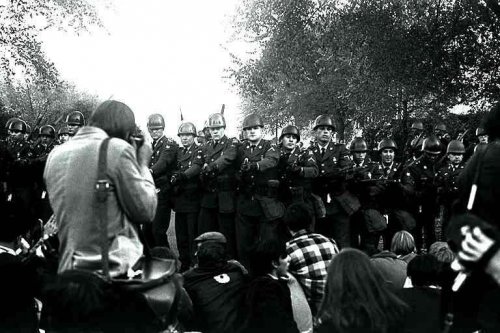
da "Blows Against The Empire" (1970)
Brano d'apertura del primo album dei Jefferson Starship, dopo il grande successo di Volunteers degli Airplane.
Così presenta l'album in un interessante articolo il critico Riccardo Bertoncelli (che stavolta non "spara cazzate"...):
da "Jefferson Starship - Blows Against The Empire" di Riccardo Bertoncelli
[Del nucleo originale dei Jefferson Airplane] nel '70 ritroviamo solo Paul Kantner e Grace Slick, all'inizio fra l'altro di una tenera (effimera) storia d'amore. Mentre gli altri si tirano indietro o vanno in tour o fanno vacanza (Jorma e Jack passano settimane in Scandinavia dedicandosi al pattinaggio), i due entrano ai Pacific High Studios e cominciano a stendere bozze per quello che potrebbe essere il nuovo disco dei Jefferson o forse no. Non è ben chiaro se il gruppo sopravviverà e, nel dubbio, Kantner decide di trasformare le idee in un progetto... (continua)
Brano d'apertura del primo album dei Jefferson Starship, dopo il grande successo di Volunteers degli Airplane.
Così presenta l'album in un interessante articolo il critico Riccardo Bertoncelli (che stavolta non "spara cazzate"...):
da "Jefferson Starship - Blows Against The Empire" di Riccardo Bertoncelli
[Del nucleo originale dei Jefferson Airplane] nel '70 ritroviamo solo Paul Kantner e Grace Slick, all'inizio fra l'altro di una tenera (effimera) storia d'amore. Mentre gli altri si tirano indietro o vanno in tour o fanno vacanza (Jorma e Jack passano settimane in Scandinavia dedicandosi al pattinaggio), i due entrano ai Pacific High Studios e cominciano a stendere bozze per quello che potrebbe essere il nuovo disco dei Jefferson o forse no. Non è ben chiaro se il gruppo sopravviverà e, nel dubbio, Kantner decide di trasformare le idee in un progetto... (continua)
Hide witch hide the good folks come to burn thee
(continua)
(continua)
inviata da Lorenzo Masetti 6/1/2006 - 15:54
What Are Their Names
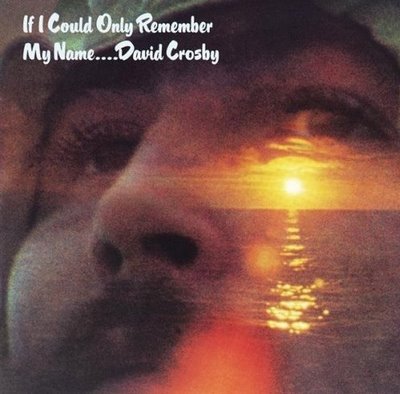
Album: If I Could Only Remember My Name (1971)
"I was ending my tour in Uncle's Army when the massacre at Kent and Jackson State happened. While in Uncle's army I had become radicalized and more anti-war, anti-military and anti-government each day, but this numbed me. Now the government was not only sending American youth to kill Asian youth but it was killing its' own children on college campuses...what's next?"
This was when the music and the message became louder and bolder. David Crosby of Crosby, Stills, Nash & Young released a solo LP later in 1970, If I Could Only Remember My Name, that would address issues such as drugs, love and war. In the song What Are Their Names Crosby wondered who the old men were who could send children off to war and perhaps we should pay them a visit. Backed by a who's/who of San Francisco musicians, this LP is perhaps the most creative music Crosby... (continua)
"I was ending my tour in Uncle's Army when the massacre at Kent and Jackson State happened. While in Uncle's army I had become radicalized and more anti-war, anti-military and anti-government each day, but this numbed me. Now the government was not only sending American youth to kill Asian youth but it was killing its' own children on college campuses...what's next?"
This was when the music and the message became louder and bolder. David Crosby of Crosby, Stills, Nash & Young released a solo LP later in 1970, If I Could Only Remember My Name, that would address issues such as drugs, love and war. In the song What Are Their Names Crosby wondered who the old men were who could send children off to war and perhaps we should pay them a visit. Backed by a who's/who of San Francisco musicians, this LP is perhaps the most creative music Crosby... (continua)
I wonder who they are
(continua)
(continua)
15/12/2004 - 20:09
×
![]()

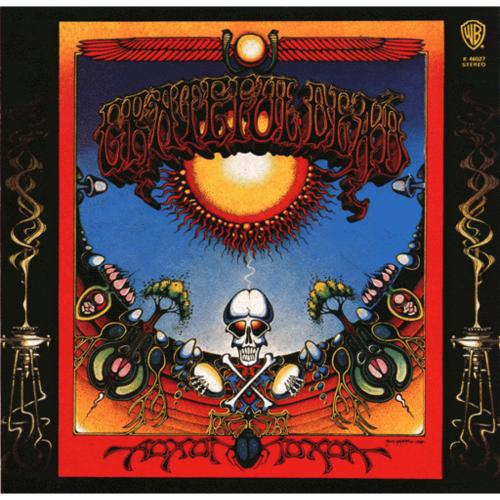
Jerry Garcia - Phil Lesh - Robert Hunter
Released: June 1969
Album / Albumi: Aoxomoxoa [1970]
Ora che il famoso “Natale diverso” è passato, come tutti gli anni, è arrivato -sempre come tutti gli anni- il giorno dopo. Che sia un giorno dopo, almeno qui dove mi trovo attualmente, lo si vede anche dal fatto che ieri è stata una giornata da lupi: pioggia fitta incessante, buio a mezzogiorno e, in serata, pure la neve. Davvero un Natale da “Day after”; solo che, il day after, quello vero -cioè oggi- splende un magnifico sole. E, sotto questo magnifico sole, mi ha colto una questione fondamentale: ma in mezzo a tutte queste canzoni natalizie, giojosi canti, perfide canzoni antinatalizie, Gesù Bambini, presepi, famiglie che si cazzottano a Natale, fattoni pisani a Natale, villancicos catalani e filastrocche con gli asinelli, una canzone sul povero Santo Stefano, il protomàrtire del giorno... (continua)